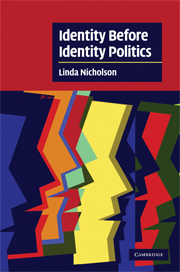Book contents
- Frontmatter
- Contents
- Acknowledgements
- Introduction
- 1 The politics of identity: race and sex before the twentieth century
- Introduction to chapters 2 and 3
- 2 Freud and the rise of the psychological self
- 3 The culture concept and social identity
- Introduction to chapters 4 and 5
- 4 Before Black Power: constructing an African American identity
- 5 Womem's identity/women's politics
- Epilogue: identity politics forty years later: assessing their value
- Index
- Cambridge Cultural Social Studies
Epilogue: identity politics forty years later: assessing their value
Published online by Cambridge University Press: 17 July 2009
- Frontmatter
- Contents
- Acknowledgements
- Introduction
- 1 The politics of identity: race and sex before the twentieth century
- Introduction to chapters 2 and 3
- 2 Freud and the rise of the psychological self
- 3 The culture concept and social identity
- Introduction to chapters 4 and 5
- 4 Before Black Power: constructing an African American identity
- 5 Womem's identity/women's politics
- Epilogue: identity politics forty years later: assessing their value
- Index
- Cambridge Cultural Social Studies
Summary
Feminist and black politics, as identity politics, celebrated black and female identities. The celebration was to counter negative elements of older naturalized versions of identity and to attain ends judged unreachable by individualistic accounts of identity. From the perspective of proponents of identity politics, while arguments which pointed to the individual nature of human character challenged the legalized discrimination justified by naturalistic accounts, they accomplished little else. For young, college-educated black men and women who identified with the poor and working-class communities from whichmany had come, and for young, first generation, college-educated black and white women who were trying to resolve tensions between expectations in private and public life, such claims about the individual nature of identity were inadequate to the newly pressing needs of the time. For blacks, claims about the individual nature of human character allowed only for the advancement of those few individual blacks who most resembled whites. For these young women, such claims similarly allowed only for the political and economic advancement of a few and left unchallenged prevailing attitudes about private life. For many in both groups, a more radical assault on the social order was required. Identity politics were born out of the belief in the necessity of such a radical assault.
The above narrative, elaborated in the preceding chapters, explains the context for the emergence of identity politics.
- Type
- Chapter
- Information
- Identity Before Identity Politics , pp. 176 - 186Publisher: Cambridge University PressPrint publication year: 2008

